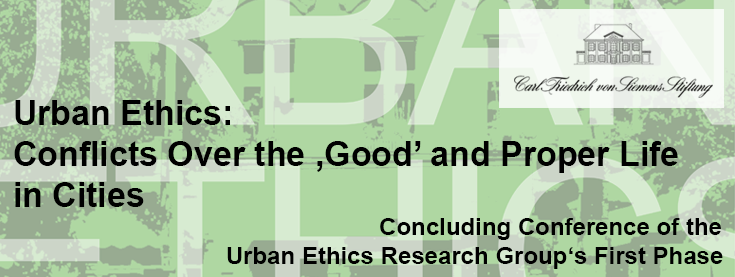Conflicts Over the ‚Good’ and Proper Life in Cities - Concluding Conference of the Urban Ethics Research Group's First Phase

January 17th - 19th 2018
Carl-Friedrich-von-Siemens-Foundation
Südliches Schloßrondell 23, Munich/Germany
With contributors from outside the research group (in alphabetical order):
Stephanie Assmann (Sapporo); Martin Baumeister (Rome); Isabelle Doucet (Manchester); Alexa Färber (Hamburg); Susanne Heeg (Frankfurt); Kerstin Jacobsson (Stockholm); Nora Lafi (Berlin); Henrietta Moore (London); Andrea Muehlebach (Toronto); Ida Susser (New York).
The conference will be held in English.
Click here for the detailed programme
“How should one live in the city?” Questions like this are being debated, practically negotiated and fought over all over the world. What is a “good” life under urban conditions? Who gets to live it? How can people get there? Can a connection between the “good” and the “just” be formed? What does it mean to aspire to an emphatically “urban” way of life? What does ‘urban’ refer to in such contexts? And how can ideals and strivings like these being brought into alignment with the ‘material’ interests and imperatives of different groups?
Such questions are questions of urban ethics. Urban ethics are a layer of the social process and urban life that has become increasingly important in recent times and in different parts of the world. It has also drawn more and more academic attention. The conference will address this “ethical turn” in urban life and politics and its history in its plurality, from the perspective of ethnographic and archive-based empirical research and sociocultural theory. Rather than seeking answers to these questions in a normative register, that is, rather than trying to figure out what the ‘good’ and proper life in cities really is, the conference asks what happens when urban conflicts and urban futures are being performed, framed and negotiated as conflicts over the ‘good’ and proper life in cities, that is, as urban ethics, and it seeks to better understand the conditions under which these questions emerge and urban-ethical projects are being formed and fought over.
What, then, are the forms, the implications and the effects of an “ethical turn” in urban life and politics, and of urban-ethical practices? What are the contextual meanings and the effects of “ethical” urban projects – concerning, among other things, housing, environmental matters, urban aesthetics, everyday interactions, citizenship and political representation – in contemporary cities like Munich, but also Tokyo, Moscow, Singapore, Auckland, Berlin, Bucharest or Istanbul? What emerges, what gets lost? Who initiates and leads them, who is being represented in what ways, and what forms of subjectivity and collectivity are being produced? Who and what is being excluded and dominated? In what ways do urban ethics draw on tacit ‘moral economies’ of urban life? In what ways are they socially creative, instituting new social and socio-material relationships? In what ways do they merge with technologies of urban governance that address citizens/subjects as self-reliant, self-guiding ‘ethical’ subjects? In what sense are they thus part of neoliberal paradigms, and in what sense are they not? In what ways do sets of practices that are seen as “ethical” circulate transnationally, and how are they re-contextualized and shaped into assemblages that are simultaneously local and transnational? And how can current conjunctures be historicized by comparing recent cases to older ones where similar questions were being raised?
At the conference, case studies from East Asia, Europe, North America and Oceania will be presented. A first panel will look at the semantics and the historical trajectories and comparisons of urban ethics. This will be followed, in the second panel, by an in-depth consideration of “collaboration” as a prominent ethical demand and practice in urban contexts. The third panel will take up urban ethics are they being performed in architecture, emphatic/intentional urbanism, and social design. The fourth panel will focus on the contentious re-negotiations of ethics and politics in urban protest movements. The conference will also ask, on a more general, methodological/theoretical level, what a focus on urban ethics can contribute to interdisciplinary research on cities and urban life.
The conference features internationally renowned researchers as panelists and key note speakers. It will present results of an interdisciplinary working group on urban ethics combining Architecture and Urban Design, Anthropology, European Ethnology, Geography, Eastern European History, Japanese Studies, Turkish Studies, based at the universities of Munich, Göttingen, and Regensburg, which has been funded by the German Research Council (DFG) for two and a half years and will begin a second research phase in April 2018.
The conference will be held in English.
For organizational reasons it is necessary for you to register by sending an eMail to: urbane-ethiken@lmu.de

